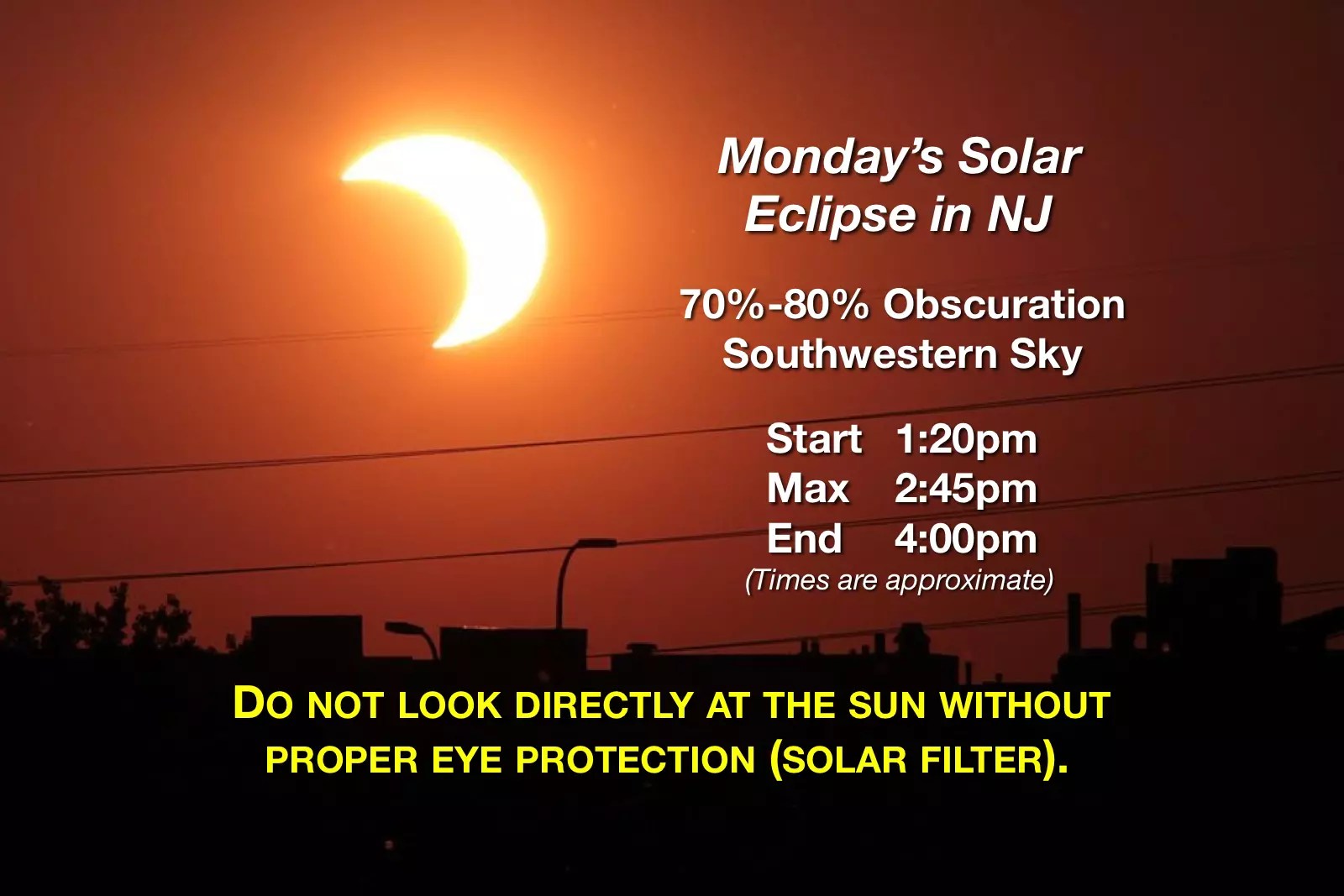As residents of New Jersey eagerly anticipate celestial events, the solar eclipse stands out as a significant occasion. Understanding the precise timing and nature of solar eclipses is essential for enthusiasts and casual observers alike. In this article, we will explore when the solar eclipse will occur in New Jersey, what to expect, and how to make the most of this awe-inspiring event.
The solar eclipse is not just a scientific phenomenon; it is a spectacle that captures the imagination of people around the world. Observing this event can deepen our appreciation for the universe and its intricacies. In the following sections, we will delve into the details of solar eclipses, including their types, past occurrences, and what you need to know for the upcoming event in New Jersey.
Whether you are an astronomy enthusiast or someone looking to witness an extraordinary natural event, this guide will equip you with all the necessary information. From the timing of the solar eclipse in NJ to viewing tips and safety precautions, we have you covered. Let’s embark on this fascinating journey through the cosmos!
Table of Contents
- What is a Solar Eclipse?
- Types of Solar Eclipses
- History of Solar Eclipses in NJ
- When is the Next Solar Eclipse in NJ?
- How to View a Solar Eclipse Safely
- Best Places to View the Eclipse in NJ
- What to Expect During the Eclipse
- Conclusion
What is a Solar Eclipse?
A solar eclipse occurs when the Moon passes between the Earth and the Sun, blocking all or part of the Sun's light. This celestial event can be a partial or total eclipse, depending on the alignment of the three celestial bodies. Solar eclipses have captivated humans for centuries, inspiring awe and wonder about the universe.
Types of Solar Eclipses
There are three main types of solar eclipses:
- Total Solar Eclipse: The Moon completely covers the Sun, and the day turns to night for a brief period.
- Partial Solar Eclipse: Only a portion of the Sun is obscured by the Moon.
- Anular Solar Eclipse: The Moon covers the Sun's center, leaving a ring-like appearance of the Sun's outer edges.
History of Solar Eclipses in NJ
New Jersey has witnessed several solar eclipses throughout its history. Notably, the total solar eclipse of August 21, 2017, was a significant event that attracted thousands of spectators across the country, including NJ. This eclipse provided a unique opportunity for residents to experience the wonders of the cosmos firsthand.
When is the Next Solar Eclipse in NJ?
The next solar eclipse visible in New Jersey will occur on April 8, 2024. This will be a total solar eclipse, making it an exciting event for astronomers and the general public alike. The path of totality will allow residents in certain areas of NJ to experience the breathtaking spectacle of a total eclipse.
Timing of the Solar Eclipse in NJ
The timing of the solar eclipse in New Jersey on April 8, 2024, is as follows:
- Start of Partial Eclipse: 2:13 PM EDT
- Start of Total Eclipse: 3:26 PM EDT
- End of Total Eclipse: 3:29 PM EDT
- End of Partial Eclipse: 4:37 PM EDT
How to View a Solar Eclipse Safely
Viewing a solar eclipse requires special precautions to protect your eyes. Here are some tips to ensure a safe viewing experience:
- Use certified solar eclipse glasses that meet the ISO 12312-2 international safety standard.
- Avoid looking directly at the Sun without proper eye protection.
- Consider using a solar viewer or pinhole projector to observe the eclipse indirectly.
Best Places to View the Eclipse in NJ
For the best viewing experience of the solar eclipse in NJ, consider these locations:
- Liberty State Park: Offers unobstructed views of the sky and plenty of space for gathering.
- Delaware Water Gap National Recreation Area: A scenic location to experience the eclipse amidst nature.
- Observatories and Planetariums: Many local observatories will host special events for the eclipse.
What to Expect During the Eclipse
During the solar eclipse, you can expect a gradual dimming of sunlight followed by a sudden darkness during the total phase. Wildlife may behave unusually, and temperatures may drop slightly. It’s a unique opportunity to experience the beauty and mystery of our solar system.
Conclusion
In summary, the solar eclipse on April 8, 2024, promises to be a spectacular event for New Jersey residents. By understanding the timing, safety precautions, and ideal viewing locations, you can prepare to enjoy this celestial phenomenon. Don’t miss out on this opportunity to witness the wonders of the universe. Feel free to leave your comments, share this article, or explore more topics on our site!
We hope you found this guide informative and engaging. Remember to mark your calendars for the upcoming solar eclipse and prepare to be amazed!
- Yololary Onlyfans
- Brandon Steven Net Worth Forbes
- Ticket Vs Citation
- Dr Phil Donald Trump
- Carol Luistro Obituary
- Whats In A Big Mac
- Bruce A Piekarsky
- Did Kamala Harris Used To Date Montel Williams
- Heather Robinson Tim Robinson
- Sophie Rain Naked


